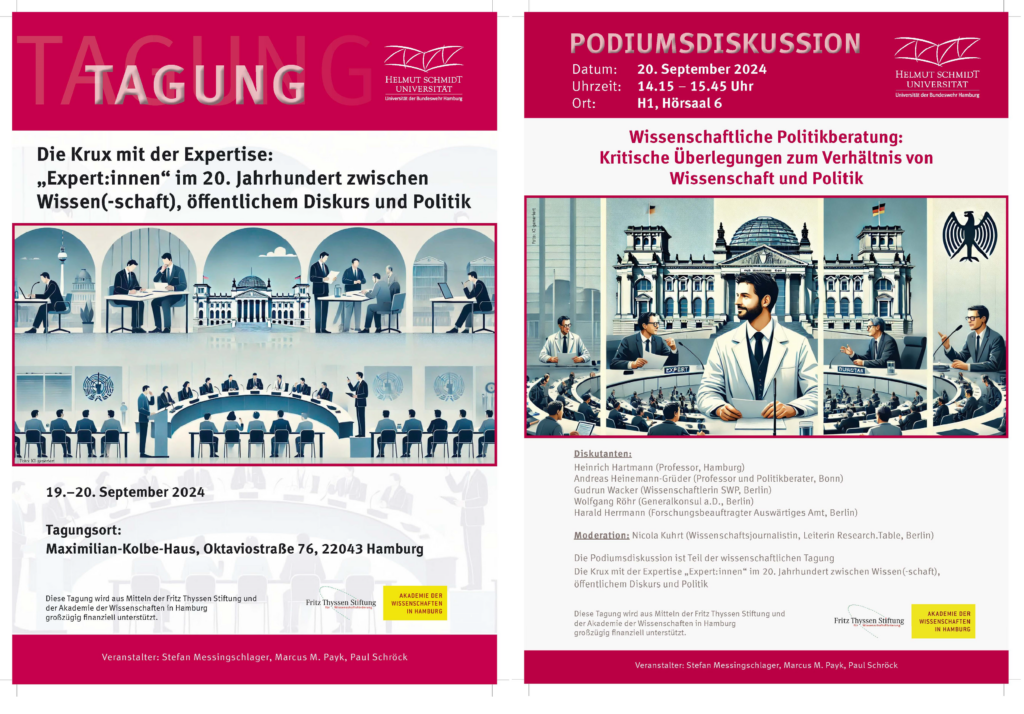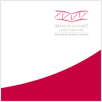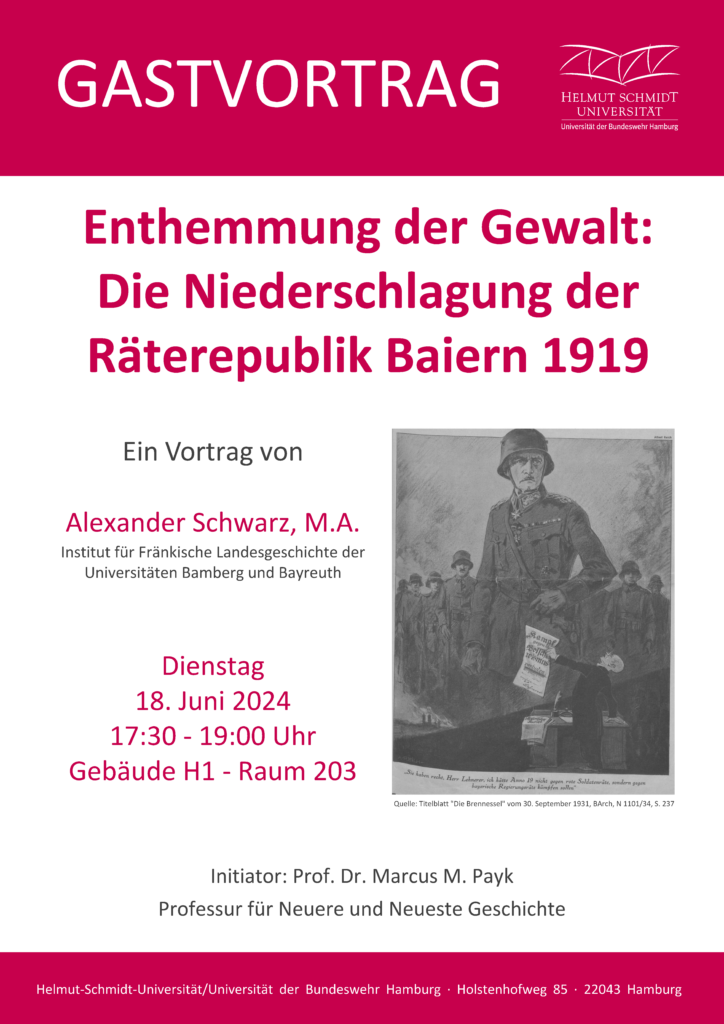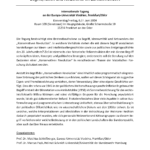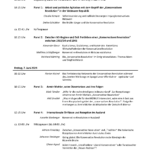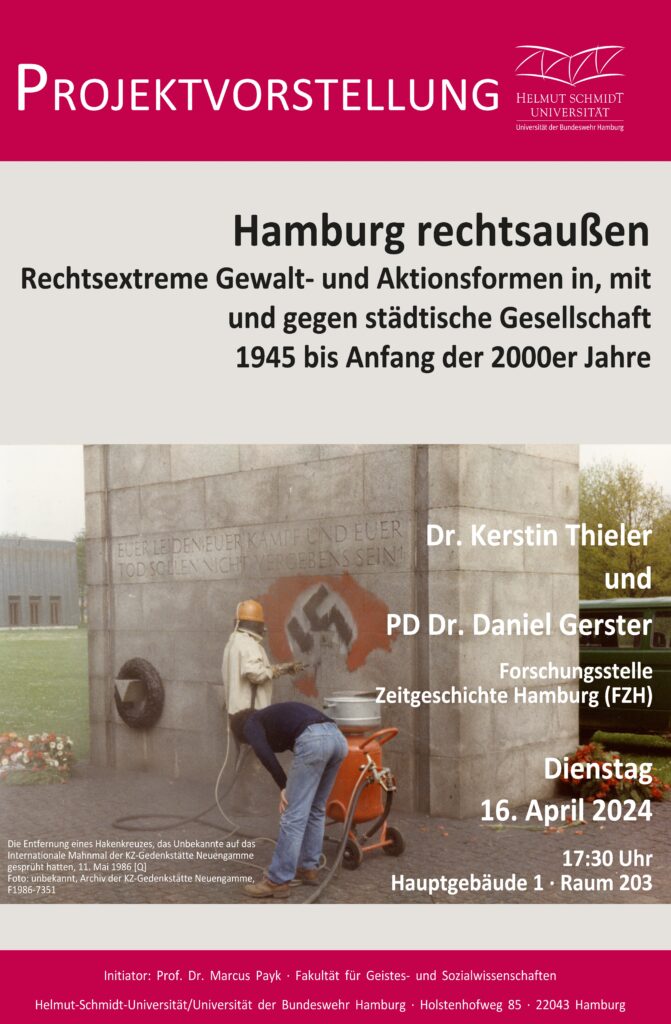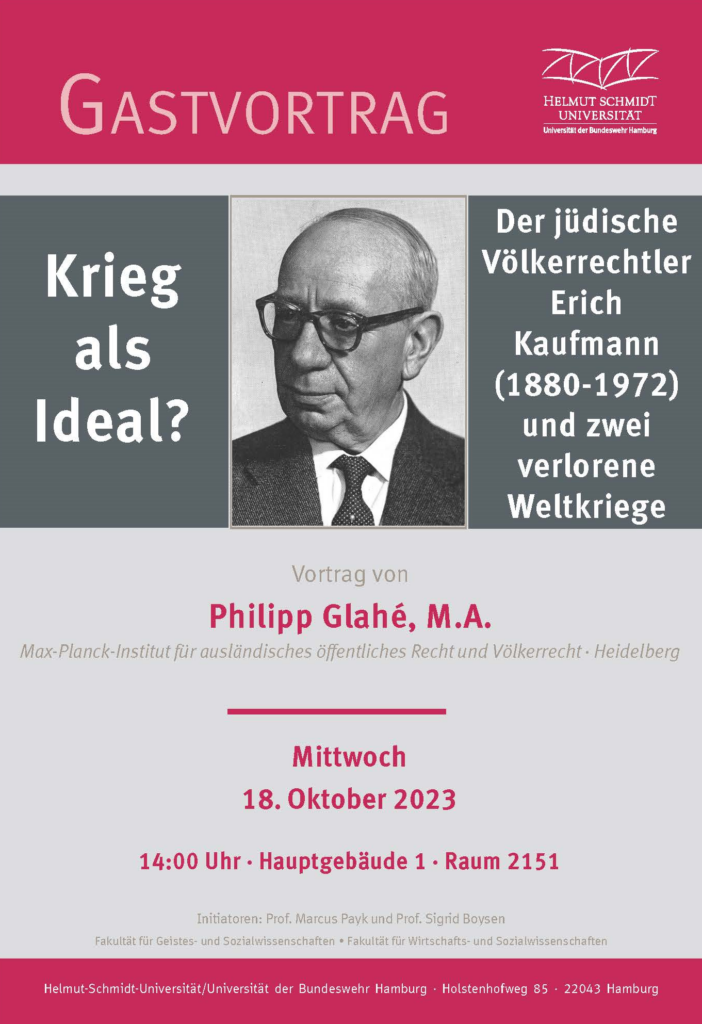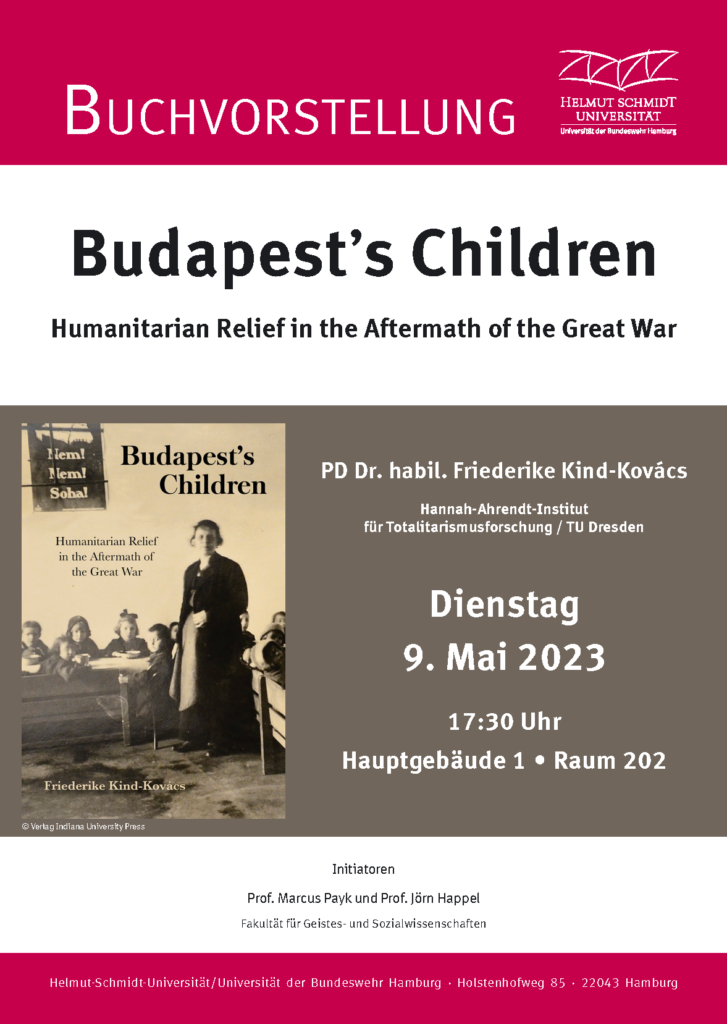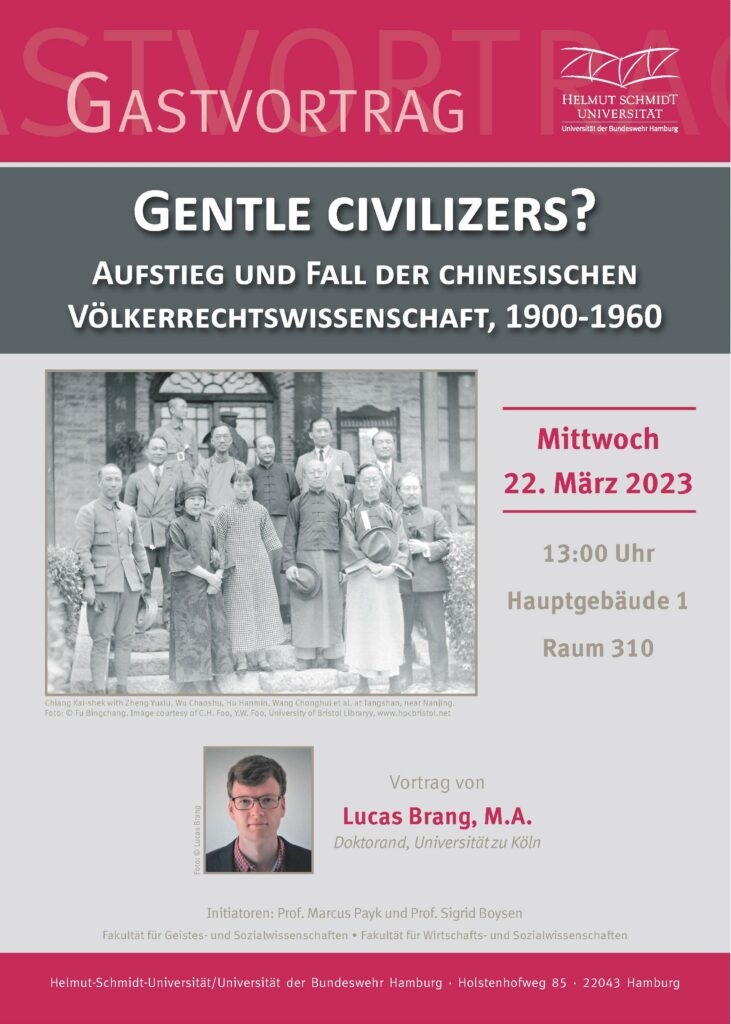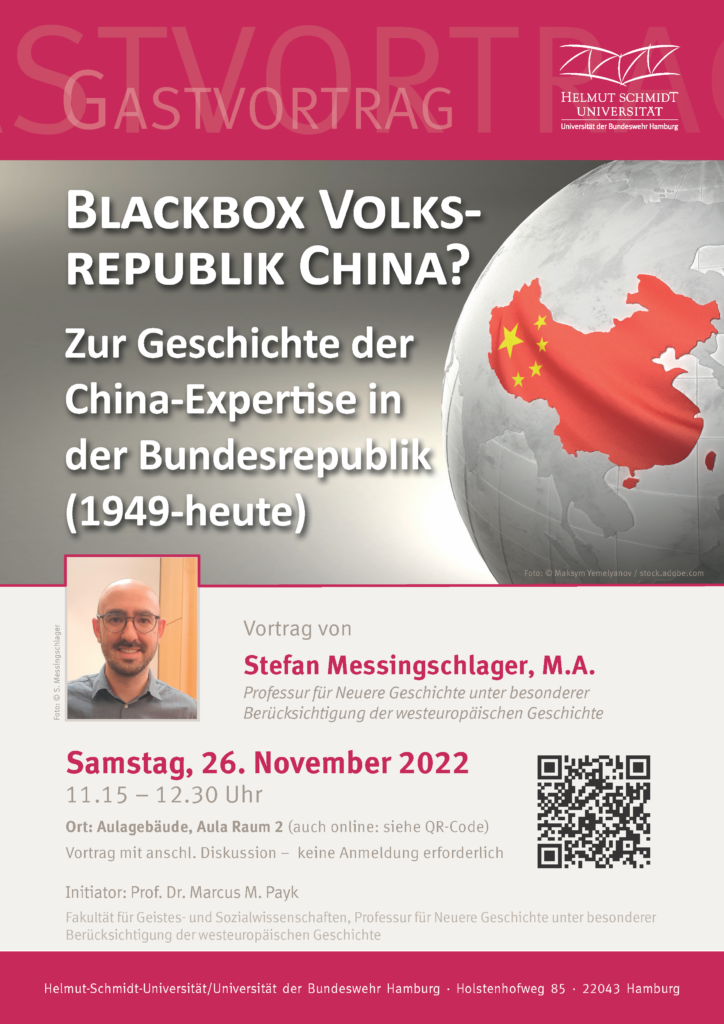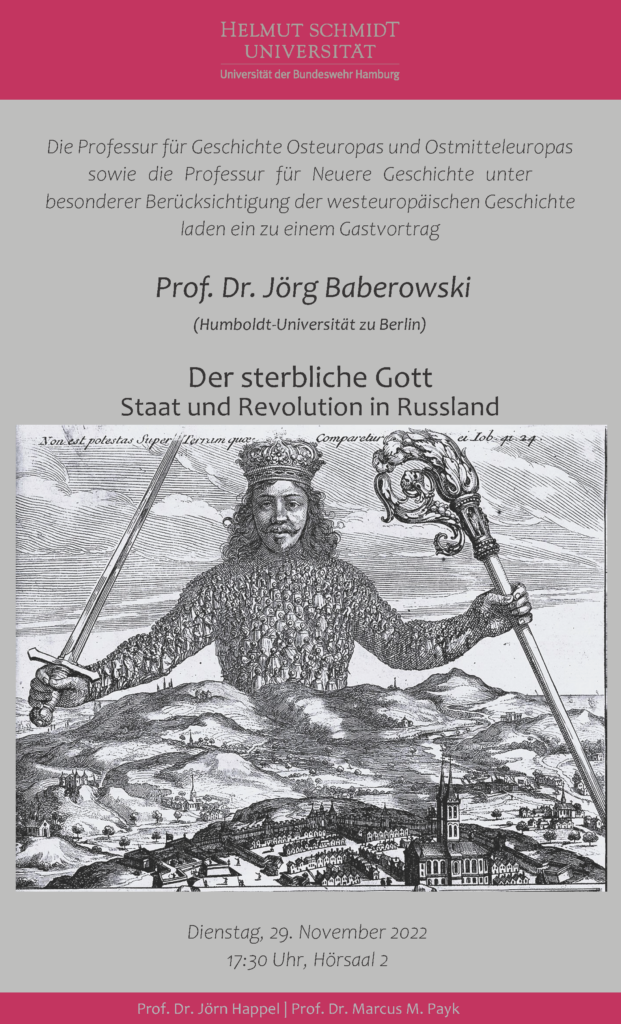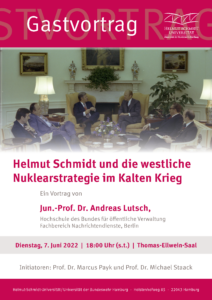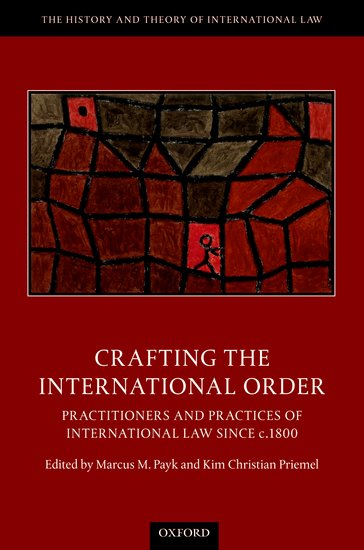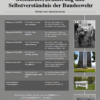Guest Lecture
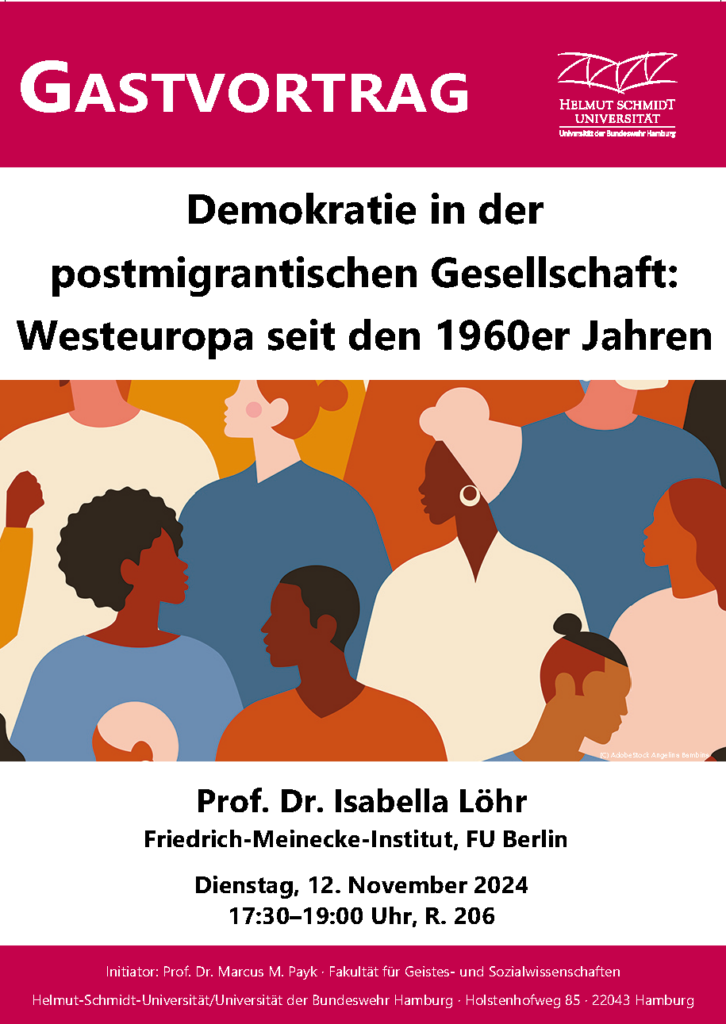
Guest Lecture
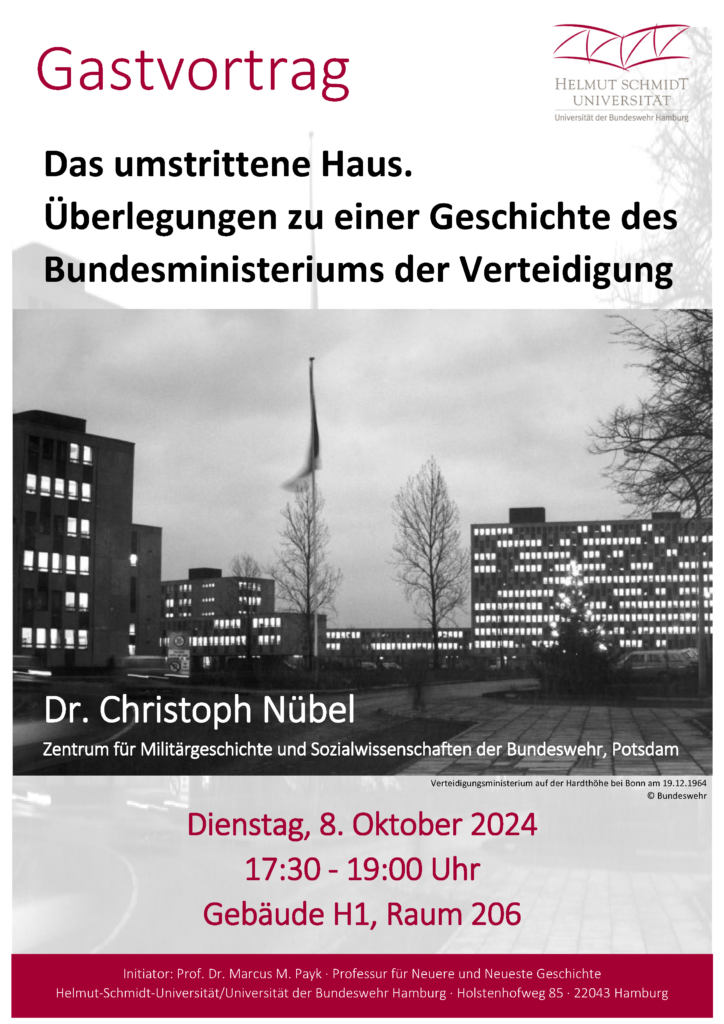
Workshop, September 19/20th, 2024
“Experts” in the 20th Century: Between Academia, Public Discourse, and Politics
In recent years, there has been much discussion about experts, their role in politics and the public sphere and the influence they exert. In our workshop, we want to reflect together on the phenomenon of expertise between academia, public discourse and politics and thus open up the construct of expertise as a multifaceted and dynamic phenomenon.
Guest Lecture
Conference
Project presentation
Workshop
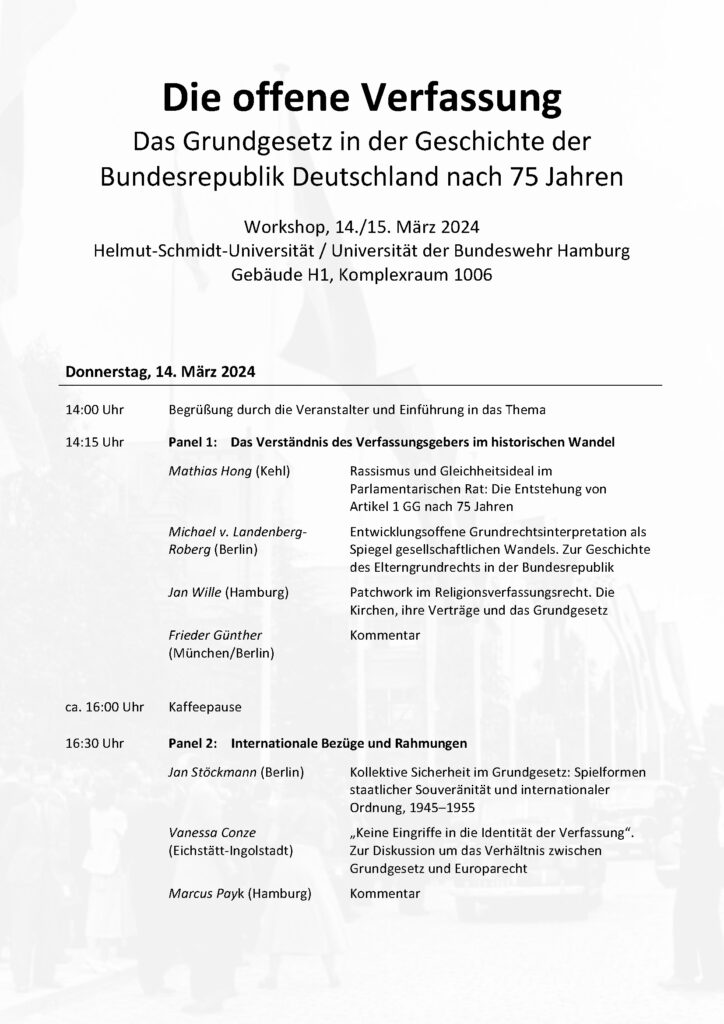
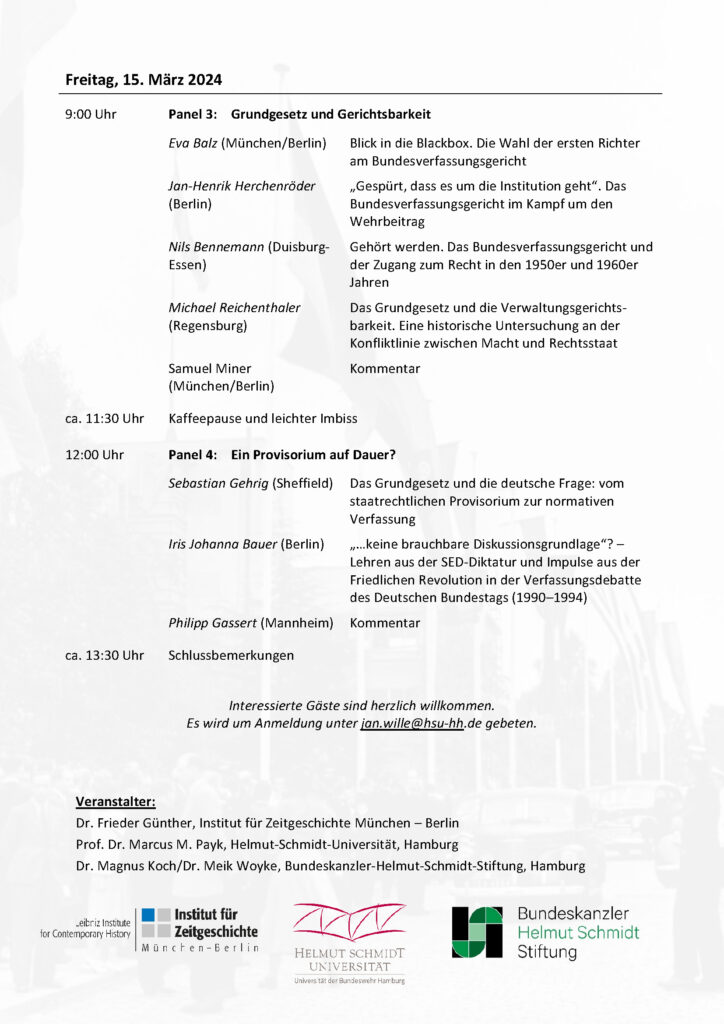
Guest Lecture
Book launch
Disscussion event
Stefan Messingschlager zu Gast bei “Redezeit” von NDR Info zum Thema “Deutscher China-Kurs – wie viel Wandel ist nötig?”, 18.04.2023, 20.23-22.00 Uhr.
Die Sendung ist als Videoaufzeichnung unter folgendem Link abrufbar: https://www.ndr.de/nachrichten/info/epg/Deutscher-China-Kurs-wie-viel-Wandel-ist-noetig,sendung1341970.html
Guest Lecture
Guest Lecture
Guest Lecture
Guest Lecture
Workshop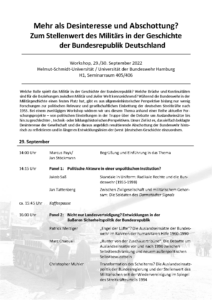
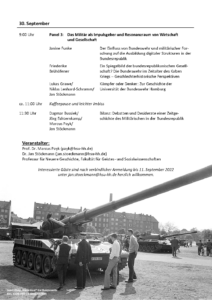
Recently published
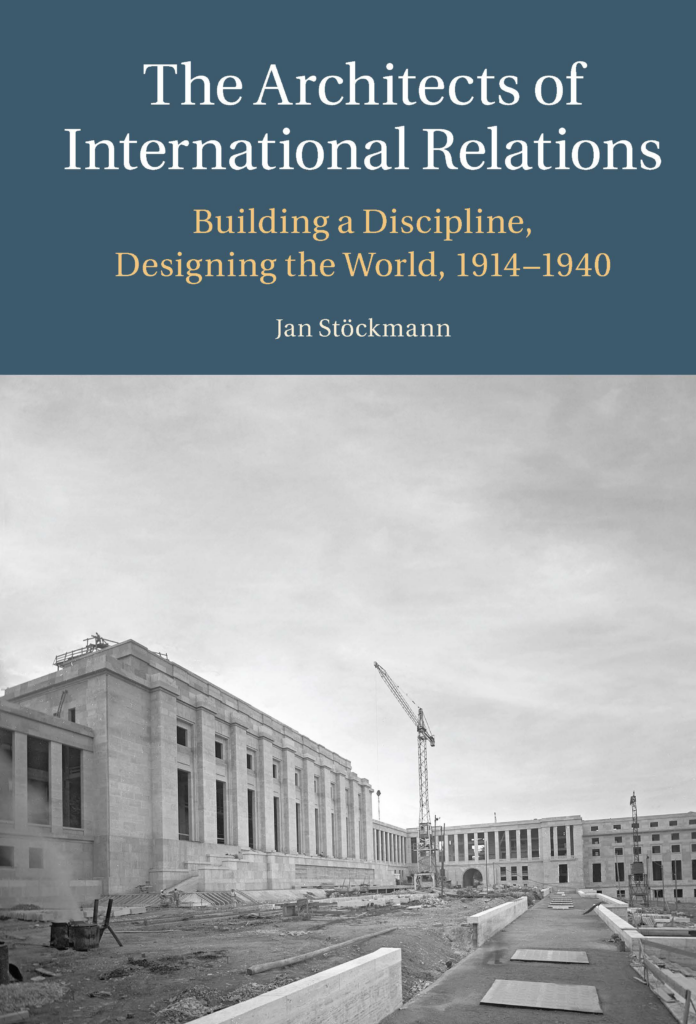
Contribution
Am 5. April 2022 erschien in der „FAZ – Frankfurter Allgemeine Zeitung“ ein Gastbeitrag von PD Dr. Michael Jonas mit dem Titel „Dauerhaft neutral oder geteilt – Ein Vorbild für die Ukraine? Welche Schlüsse Finnland zog, als es im Winterkrieg 1939/1940 vom sowjetischen Nachbar überfallen wurde“
Guest Lecture
2019
“ZEITGESCHICHTE DES RECHTS”
Themenheft der Zeithistorischen Forschungen 02/2019
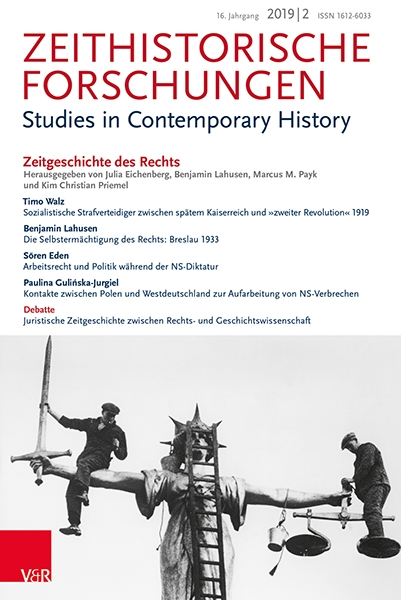
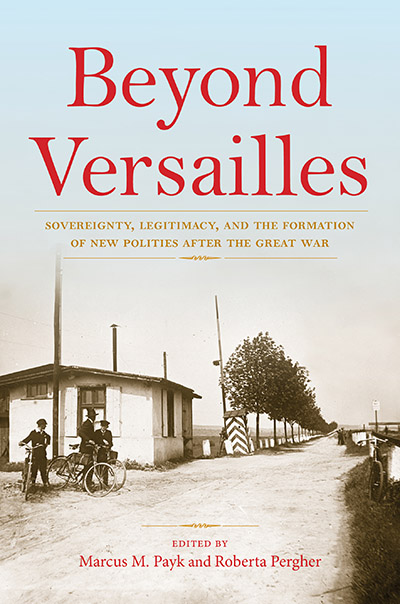
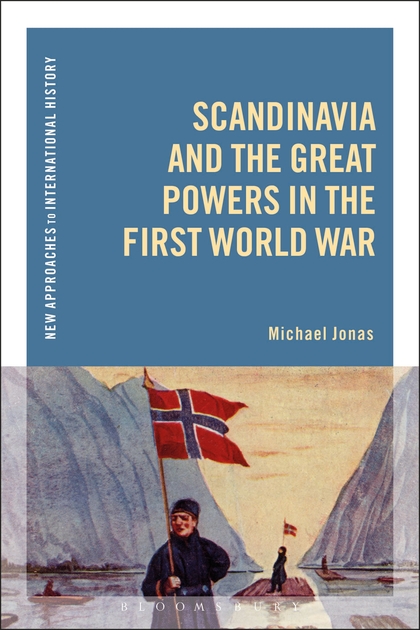
2018
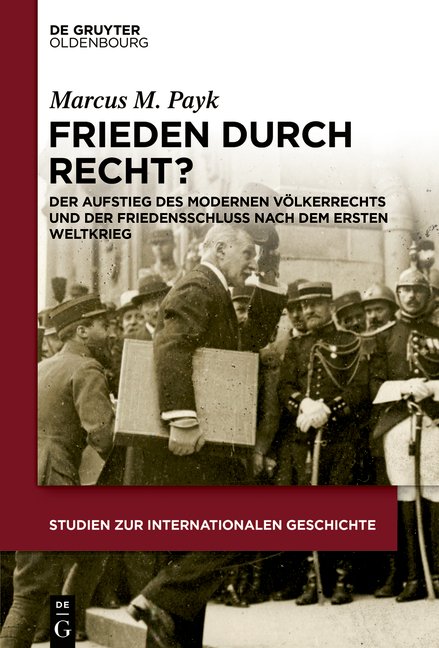
Inaugural Lectures
Donnerstag, 14. November, 16:00 – 18:00 Uhr, Seminarraum 405
Univ.-Prof. Dr. Monika Daseking
Professur für Pädagogische Psychologie
Übergang vom Kindergarten in die Grundschule: Rolle der Einschulungsuntersuchung
Univ.-Prof. Dr. Alice Yvonne Nestoriuc
Professur für Klinische Psychologie
Bessere Gesundheit durch bessere Erwartungen? Klinische Forschung zum Placebo- und Nocebo-Effekt
Univ.-Prof. Dr. Marcus Payk
Professur für Neuere Geschichte unter bes. Berücksichtigung der westeuropäischen Geschichte
Was heißt internationale regelbasierte Ordnung? Anmerkungen aus historischer Perspektive
Guest Lecture
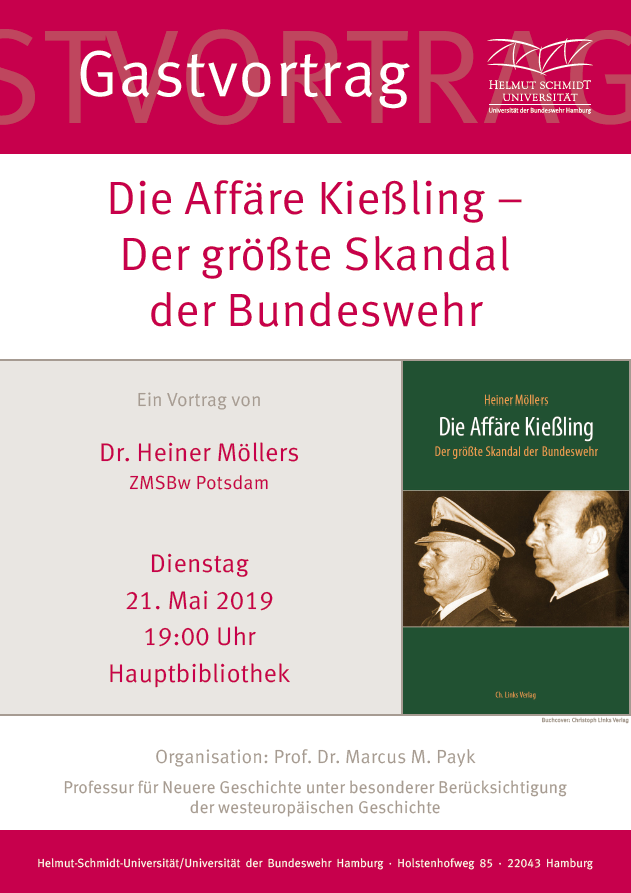
Research Seminar
Helmut Schmidt und die internationale Politik
am 23. Dezember 2018 jährt sich zum 100. Mal der Geburtstag von Helmut Schmidt. Aus diesem Anlass veranstalten Professor Michael Staack (Professur für Theorie und Empirie der Internationalen Beziehungen), Professor Bernd Wegner und PD Dr. Michael Jonas (Professur für Neuere Geschichte) ein Internationales Wissenschaftliches Kolloquium, das sich anhand ausgewählter Fallstudien kritisch reflektierend mit dem außenpolitischen Wirken und Selbstverständnis des Staatsmanns, Hanseaten und Namensgebers der Universität der Bundeswehr Hamburg beschäftigt. Folgende Themen stehen u.a. auf dem Programm: Der Weltkanzler und die internationale Politik, The Schmidt-style of Ostpolitik, Helmut Schmidt und die Reform der Bundeswehr, Nachbar China – Helmut Schmidts China-Bild nach dem Ende seiner Kanzlerschaft, Helmut Schmidt und die deutsch-amerikanischen Beziehungen, Transatlantische Nuklearwaffenpolitik, Helmut Schmidt, Valéry Giscard dÉstaing und die deutsch-französischen Beziehungen. Hinzu kommt ein Gespräch der Veranstalter mit ZEIT-Chefredakteur Giovanni di Lorenzo und eine Podiumsdiskussion über die Frage, ob und inwiefern Schmidts außenpolitische Konzepte heute noch aktuell sind.
Das Kolloquium findet am 26. und 27. November 2018 im Thomas-Ellwein-Saal der HSU statt. Das vorläufige Programm finden Sie hier: Programm Kolloquium
Lecture Series
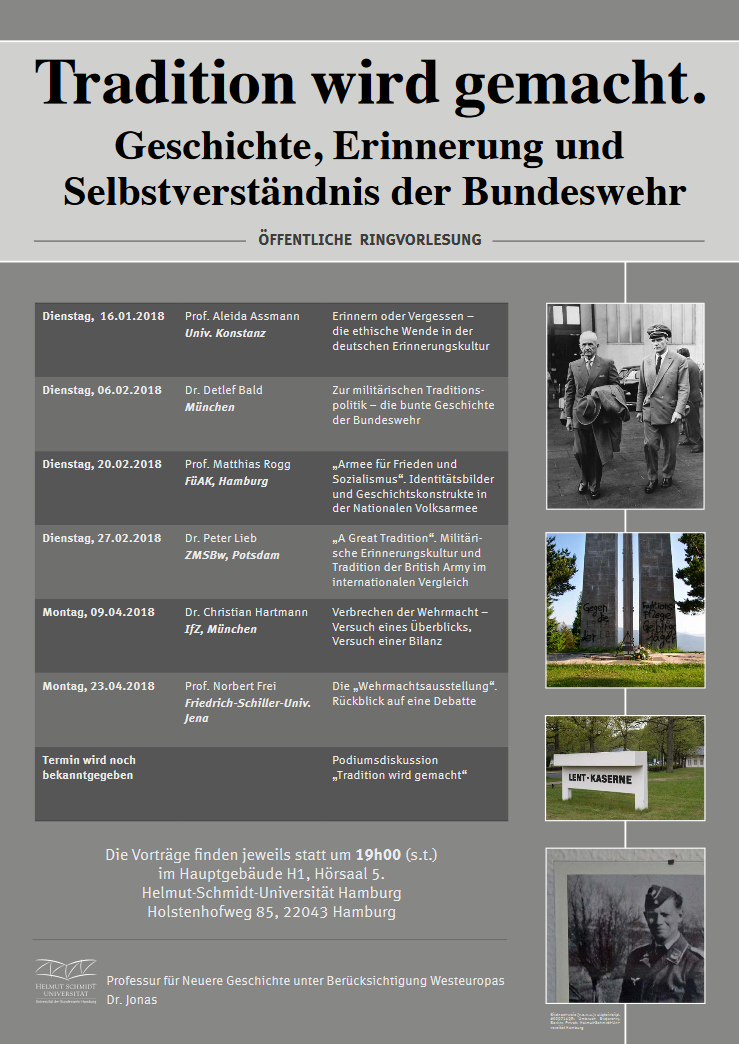
Verbrechen der Wehrmacht – Versuch eines Überblicks, Versuch einer Bilanz
Aufzeichnung des 5. Vortrags der Ringvorlesung „Tradition wird gemacht. Geschichte, Erinnerung und Selbstverständnis der Bundeswehr“ am 09.04.2018 von Dr. Christian Hartmann ( Institut für Zeitgeschichte, München).
„A Great Tradition“. Militärische Erinnerungskultur und Tradition der British Army im internationalen Vergleich
Aufzeichnung des 4. Vortrags der Ringvorlesung „Tradition wird gemacht. Geschichte, Erinnerung und Selbstverständnis der Bundeswehr“ am 27.02.2018 von Dr. Peter Lieb (Zentrum für Militärgeschichte und Sozialwissenschaften der Bundeswehr, Potsdam).
„Armee für Frieden und Sozialismus“. Identitätsbilder und Geschichtskonstrukte in der Nationalen Volksarmee
Aufzeichnung des 3. Vortrags der Ringvorlesung „Tradition wird gemacht. Geschichte, Erinnerung und Selbstverständnis der Bundeswehr“ am 20.02.2018 von Oberst Prof. Dr. Matthias Rogg (Führungsakademie der Bundeswehr, Hamburg).
Zur militärischen Traditionspolitik – die bunte Geschichte der Bundeswehr
Aufzeichnung des 2. Vortrags der Ringvorlesung „Tradition wird gemacht. Geschichte, Erinnerung und Selbstverständnis der Bundeswehr“ am 06.02.2018 von Dr. Detlef Bald (Publizist, München).
Erinnern oder Vergessen – die ethische Wende in der deutschen Erinnerungskultur
Aufzeichnung der Auftaktveranstaltung der Ringvorlesung „Tradition wird gemacht. Geschichte, Erinnerung und Selbstverständnis der Bundeswehr“ am 16.01.2018 mit Prof. Aleida Assmann (Universität Konstanz).
Guest Lecture
Prof. Mauro Campus (Universität Florenz)
“Only One Bed for Two Dreams. How Italy Joined the European Monetary System”
Dienstag, 20. März 2018, 18.00 Uhr
Hauptbibliothek
Veranstalter: PD Dr. Michael Jonas und Prof. Dr. Patrick O. Cohrs
Hier schreibt Professor Campus, worum es in seinem Vortrag geht:
This talk is a draft of a more comprehensive research on the political and economic history of Italy’s joining the European monetary integration, in which I will deal the general issues laid out here.
The complete outline includes: the development of official and unofficial Italian attitude over the European monetary cooperation; Italian economic diplomacy after the fall of the Snake; the internal dispute on the opportunity to joint the European Monetary System and the political decision to joint it; the EMS fall in the early 1990s, when in the aftermath of a failed attempt at international currency coordination first in the Delors Committee and then in the work preceding the Maastricht Treaty a blueprint for the establishment of monetary union was laid out. Only the section on Italian economic diplomacy and the Communists response on the Andreotti’s Cabinet decision to joins EMS in December 1978 are presented here.
In depicting the broad institutional evolution, the history inevitably has to include a discussion of how at particular crisis moments, corresponding frequently to problems of the global financial order that strained European politics and required institutional innovation, politicians produced new and increasingly sophisticated responses. In the 1970s, the “Italian problem” made headlines in the economic press. Commentators, on a pleasant holiday from sober language, gloated over “the sick man of Europe” fiddling on “the edge of a precipice” or “the brink of disaster” or “the bridge of the sinking Titanic” according to the writer’s taste. Austere financial periodicals relished predictions that Italy would go to bankrupt. The attitude of international officialdom was far more discreet in form, but scarcely different in substance. The pressure mounted, and it was effective. Actually after the crisis of the Bretton Woods system, when the European Economic Community commissioned a report on monetary union, and later when the weakness of the dollar pushed European leaders to establish the European Monetary System along with an Exchange Rate Mechanism, Italy was not the only western European “sick man”.
The problems of economic policy in Italy in that period must be examined within the wider international, and especially European context because as never before, the direction, the intensity and the timing of internal policies has come to depend on external variables. And the political attitude to consider Italian problem as a part of a larger European problem, was profoundly present in the European establishment, especially in the German one. Is a matter of fact that the EMS negotiations were generally seen as part of the overhaul of the financial architecture for managing the restored international monetary regime of the Bretton Woods order, but European Monetary integration was seen by its architects as a self-conscious response to the rapid decline of the dollar in 1977-8 and the search for a new mechanism internationally to replace the dollar standard and to face the persistently instability in the international economic relations.
“Cesare Alfieri” School of Political Science Universityof Florence. [email protected]
Historikerseminar
Finnisch-Deutsches Historikerseminar anlässlich des 100. Jubiläumsjahres der Unabhängigkeitserklärung Finnlands
Traditionelle Partnerschaft oder „Waffenbrüderschaft“?
Neue Forschung zu den deutsch-finnischen Beziehungen im Zeitalter der Weltkriege
Traditional Partnership – Brotherhood in Arms?
New Research on the German-Finnish Relations in the Age of the World Wars
23. und 24. Oktober 2017
Helmut-Schmidt-Universität (Thomas-Ellwein-Saal)
Veranstalter und Förderer:
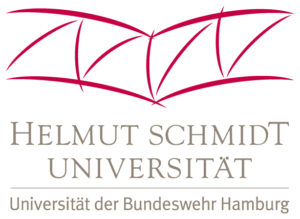
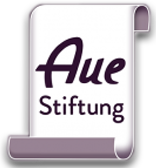
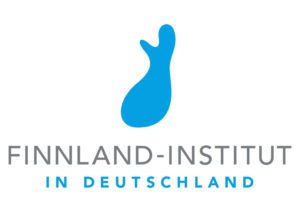

Letzte Änderung: 23. January 2025
